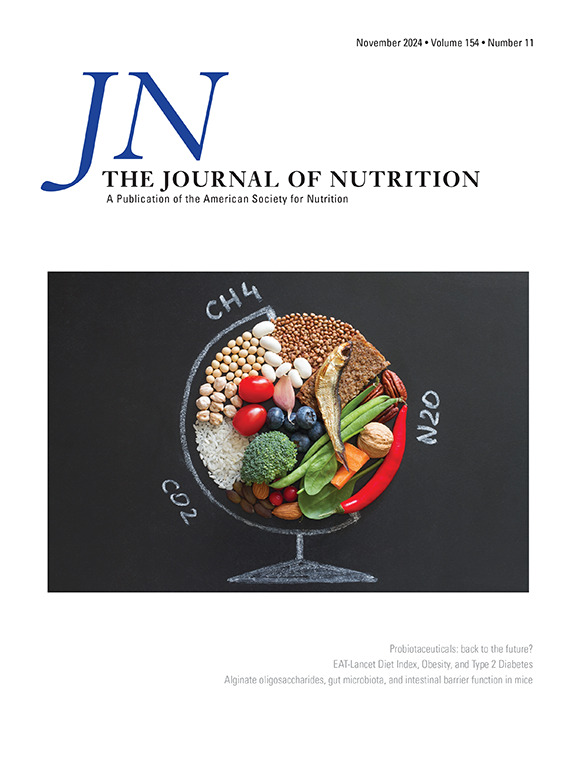橄榄苦苷补充增加静息骨骼肌PDH活性分数,但不影响全身代谢:一项随机,双盲,安慰剂对照试验,健康,老年男性。
IF 3.7
3区 医学
Q2 NUTRITION & DIETETICS
引用次数: 0
摘要
背景:多酚橄榄苦苷激活线粒体钙进口,从而增加丙酮酸脱氢酶(PDH)活性。临床前,补充橄榄苦苷后PDH活性的增加导致线粒体生物能量学和抗疲劳能力的改善。目的:本研究旨在探讨急性和慢性橄榄苦苷补充对老年男性肌肉能量代谢、全身底物代谢、力量和抗疲劳能力的影响。方法:在一项随机、双盲、安慰剂对照试验中,40名健康老年男性(60±5岁)每天接受安慰剂(PLA)或100mg橄榄叶提取物橄榄苦苷(OLE)补充剂,持续36天。在第1天和第36天,在摄入补充剂之前和之后120分钟内,采集肌肉和血液样本,并进行间接量热测定。在补充前后29天测量腿部力量和疲劳。使用ANCOVA或稳健ANCOVA对结果进行分析。结果:第1天和第36天摄入OLE增加血浆橄榄苦苷代谢物(急性OLE与PLA相比,p293磷酸化水平更高)。长期补充后,OLE组的PDH活性比PLA组高25%(49±14 vs 38±10%);P=0.016),各组间PDH绝对活性和PDH- ser293磷酸化水平无差异。线粒体呼吸和蛋白质含量、全身底物代谢、腿部力量和抗疲劳能力在OLE和PLA之间没有差异。慢性OLE与PLA后血浆LDL胆固醇较低(P=0.043),其他血液代谢指标无差异。结论:长期补充OLE导致健康老年男性骨骼肌PDH活性升高,这可能影响静息能量代谢。急性或慢性橄榄苦苷补充不会调节骨骼肌线粒体呼吸、肌肉力量、肌肉疲劳或全身底物代谢。临床试验注册:Https://clinicaltrials.gov/study/NCT05217433。注册中心:https://clinicaltrials.gov/study/NCT05217433。本文章由计算机程序翻译,如有差异,请以英文原文为准。
Oleuropein Supplementation Increases Resting Skeletal Muscle Fractional Pyruvate Dehydrogenase Activity but Does Not Influence Whole-Body Metabolism: A Randomized, Double-Blind, and Placebo-Controlled Trial in Healthy, Older Males
Background
The polyphenol oleuropein activates mitochondrial calcium import, which increases pyruvate dehydrogenase (PDH) activity. Preclinically, this increase in PDH activity following oleuropein supplementation resulted in improved mitochondrial bioenergetics and fatigue resistance.
Objectives
This study aimed to examine the effects of acute and chronic oleuropein supplementation on muscle energy metabolism, whole-body substrate metabolism, strength, and fatigue resistance in older males.
Methods
In a randomized, double-blind, placebo-controlled trial, 40 healthy older males (60 ± 5y) received either placebo (PLA) or 100 mg oleuropein from 250 mg olive leaf extract (OLE) supplementation daily for 36 d. On day 1 and day 36, muscle and blood samples were collected, and indirect calorimetry was performed before and ≤120 min following supplement intake. Leg strength and fatigue were measured before and after 29 d of supplementation. Results were analyzed using analysis of covariance or robust analysis of covariance.
Results
OLE ingestion on day 1 and day 36 increased plasma oleuropein metabolites (P < 0.001). On day 1, no differences were observed in muscle PDH activity, mitochondrial respiration, or whole-body substrate metabolism 120 min after acute OLE ingestion. Ribonucleic acid sequencing revealed upregulation of oxidative phosphorylation gene pathways (false discovery rate < 0.05), whereas PDH-Serine293-phosphorylation was higher after acute OLE compared with PLA ingestion (P = 0.015). Following chronic supplementation, fractional PDH activity was ∼25% greater in OLE compared with PLA (49 ± 14 compared with 38 ± 10%; P = 0.016) with no differences in absolute PDH activity and PDH-Serine293-phosphorylation between groups. Mitochondrial respiration and protein content, whole-body substrate metabolism, leg strength, and fatigue resistance were not different between OLE and PLA. Plasma low-density lipoprotein cholesterol was lower after chronic OLE compared with PLA (P = 0.043), with no differences in other blood metabolic markers.
Conclusions
Chronic OLE supplementation resulted in higher skeletal muscle fractional PDH activity in healthy, older males, which may impact resting energy metabolism. Acute or chronic oleuropein supplementation does not modulate skeletal muscle mitochondrial respiration, muscle strength, muscle fatigue, or whole-body substrate metabolism.
This trial was registered at clinicaltrials.gov as NCT05217433.
求助全文
通过发布文献求助,成功后即可免费获取论文全文。
去求助
来源期刊

Journal of Nutrition
医学-营养学
CiteScore
7.60
自引率
4.80%
发文量
260
审稿时长
39 days
期刊介绍:
The Journal of Nutrition (JN/J Nutr) publishes peer-reviewed original research papers covering all aspects of experimental nutrition in humans and other animal species; special articles such as reviews and biographies of prominent nutrition scientists; and issues, opinions, and commentaries on controversial issues in nutrition. Supplements are frequently published to provide extended discussion of topics of special interest.
 求助内容:
求助内容: 应助结果提醒方式:
应助结果提醒方式:


